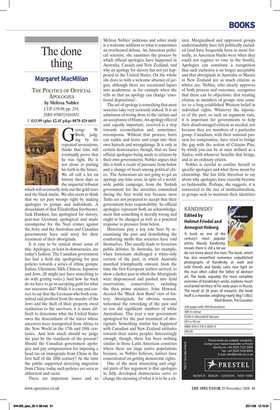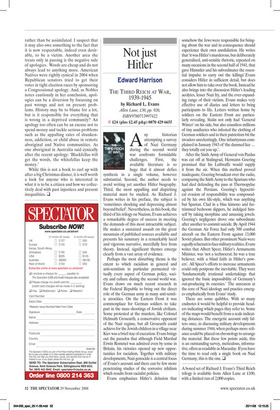The done thing
Margaret MacMillan
THE POLITICS OF OFFICIAL APOLOGIES by Melissa Nobles CUP, £19.99, pp. 214, ISBN 9780521693851 ✆ £15.99 (plus £2.45 p&p) 0870 429 6655 George W. Bush, judging by his repeated invocations, thinks that time will eventually prove that he was right. He is not alone in putting his faith in the future. We all call a lot on history these days as the impartial tribunal which will eventually dole out the gold stars and the black marks. We also seem to think that we set past wrongs right by making apologies to groups and individuals. A descendant of that Elizabethan freebooter, Jack Hawkins, has apologised for slavery; post-war Germany apologised and made recompense for the Nazi crimes against the Jews; and the Australian and Canadian governments have said sorry for their treatment of their aboriginals.
It is easy to be cynical about some of this. Apologies, at least in democracies, are today’s fashion. The Canadian government has had a field day apologising for past policies towards a series of ethnic groups: Italian, Ukrainian, Sikh, Chinese, Japanese and Jews. (It might just have something to do with getting votes.) And how far back do we have to go in accepting guilt for what our ancestors did? While it is easy and correct to say that the Germans who both committed and profited from the murder of the Jews and the theft of their property owed restitution to the survivors, it is more difficult to determine what the United States owes the descendants of the slaves whose ancestors were transported from Africa to the New World in the 17th and 18th centuries. And how much should we judge the past by the standards of the present? Should the Canadian government apologise and pay compensation for imposing a head tax on immigrants from China in the first half of the 20th century? At the time the public supported deterring migration from China; today such policies are seen as abhorrent and racist.
These are important issues and so Melissa Nobles’ judicious and sober study is a welcome addition to what is sometimes an overheated debate. An American political scientist, she examines the process by which official apologies have happened in Australia, Canada and New Zealand, and why an apology for slavery has not yet happened in the United States. On the whole she does so with a welcome absence of jargon, although there are occasional lapses into academese, as for example when she tells us that an apology can change ‘emotional dispositions’.
The act of apology is something that most societies take very seriously indeed. It is an admission of wrong done to the victims and an acceptance of blame. An apology offered and, equally important, received is a step towards reconciliation and, sometimes, recompense. Without that process, hurts can rankle and fester and erupt into their own hatreds and wrongdoings. It is only in certain democracies, though, that we have official apologies being made to citizens by their own governments. Nobles argues that this is both a result of pressure from below and a change of heart among political elites. The Armenians are not going to get an apology any time soon, in spite of a worldwide public campaign, from the Turkish government for the atrocities committed during the first world war because most Turks are not prepared to accept that their government bore responsibility. So official apologies represent both an acknowledgement that something is morally wrong and ought to be changed as well as a practical response to pressure from below.
Historians play a key role here by reexamining the past and demolishing the comforting myths that societies have told themselves. This usually leads to ferocious public debates. In Australia, for example, when historians challenged a white-only version of the past, in which Australia marched triumphantly onward, from the time the first European settlers arrived, to show a darker past in which the Aboriginals were dispossessed and pushed into fetid reservations, conservatives, including the then prime minister, John Howard, decried the ‘Black Arm Band’ view of history. Aboriginals, for obvious reasons, welcomed the reworking of the past and so too did significant numbers of white Australians. This year a new government apologised for the past treatment of aboriginals. Something similar has happened with Canadian and New Zealand attitudes towards their native peoples. Interestingly enough, though, there has been nothing similar in those Latin American countries where there are large native populations because, so Nobles believes, natives have concentrated on getting democratic rights.
One of the most interesting and original parts of her argument is that apologies in fully developed democracies serve to change the meaning of what it is to be a cit izen. Marginalised and oppressed groups understandably have felt politically excluded (and have frequently been so more formally, as American blacks were when they could not register to vote in the South). Apologies can constitute a recognition that such exclusion is no longer acceptable and that aboriginals in Australia or Maoris in New Zealand are as much citizens as whites are. Nobles, who clearly approves of both process and outcomes, recognises that there can be objections: that treating citizens as members of groups runs counter to a long-established Western belief in individual rights. Whatever the injustices of the past, so such an argument runs, it is important for governments to help their disadvantaged citizens as needed, not because they are members of a particular group. Canadians, with their national passion for compromise, have tried to bridge the gap with the notion of Citizens Plus, by which you can be at once defined as a Native, with whatever benefits that brings, and as an ordinary citizen.
Nobles is careful to confine herself to specific apologies and what those mean for citizenship. She has little therefore to say about why apologies have recently become so fashionable. Perhaps, she suggests, it is connected to the rise of multiculturalism, as groups seek to maintain their identities rather than be assimilated. I suspect that it may also owe something to the fact that it is now respectable, indeed even desirable, to be a victim. Another area she treats only in passing is the negative side of apologies. Words are cheap and do not always lead to anything more. American Natives were rightly cynical in 2004 when Republican senators tried to get their votes in tight election races by sponsoring a Congressional apology. And, as Nobles notes cautiously in her conclusion, apologies can be a diversion by focussing on past wrongs and not on present problems. History may be to blame for a lot, but is it responsible for everything that is wrong in a deprived community? An apology too often can be an excuse not to spend money and tackle serious problems such as the appalling rates of drunkenness, addiction, or child abuse in remote aboriginal and Native communities. As one aboriginal in Australia said cynically after the recent apology: ‘Blackfellas will get the words, the whitefellas keep the money.’ While this is not a book to curl up with after a big Christmas dinner, it is well worth a look for anyone who is interested in what it is to be a citizen and how we collectively deal with past injustices and present inequalities. ❑ 1



































































































 Previous page
Previous page